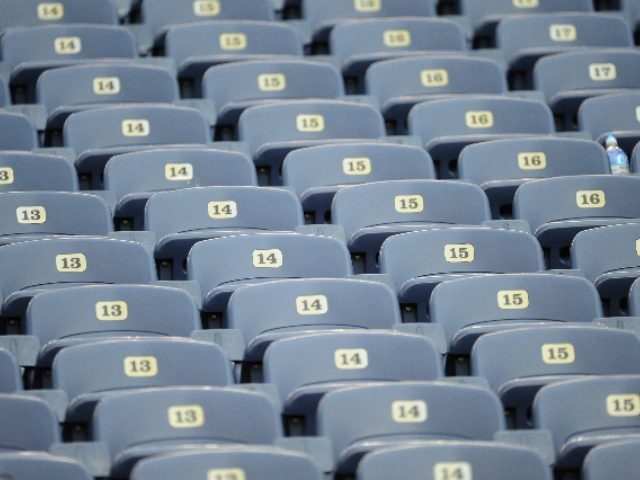College bowl games across the country are being canceled or severely impacted over the league’s year-old test requirements that have yet to be changed over.
The Wasabi Fenway Bowl, Military Bowl, EasyPost Hawaii Bowl, Tony the Tiger Sun Bowl, and the TaxSlayer Gator Bowl have all been impacted:
- The Wasabi Fenway Bowl announced the game scheduled for December 29 between the University of Virginia and Southern Methodist University had to be canceled “due to the number of COVID cases impacting its roster” with players from Virginia.
- The Military Bowl Foundation announced the game scheduled for December 27 between Boston College and East Carolina University had to be canceled. The Boston College Director of Athletics Pat Kraft said, “Unfortunately, due to cases of COVID-19 rising within our program since our arrival, along with season-ending injuries, opt-outs, and transfers, we just do not have enough players to field a team.”
- The EasyPost Hawaii Bowl announced the game scheduled for December 24 between the University of Hawaii and the University of Memphis had to be canceled after “about 30 players and staff recently tested positive for COVID-19.”
- The Tony the Tiger Sun Bowl is trying to find “any replacement” for the game scheduled for this Friday, December 31, between the University of Miami and Washington State after a “number of COVID cases” caused Miami to withdraw.
- The TaxSlayer Gator Bowl scheduled for December 31 will still be played between Wake Forest University and Rutgers University after Texas A&M withdrew due to coronavirus concerns.
Reportedly athletic departments at most colleges have curtailed the weekly coronavirus testing along with the wearing masks and social distancing over the last summer due to colleges reaching high-enough vaccination levels besides the unvaccinated or symptomatic athletes and coaches are regularly being tested.
“So far, more than 120 men’s and women’s basketball games have been canceled by the coronavirus, according to figures tracked by the NCAA,” Sports Illustrated reported, noting that the NCAA has restarted their weekly Zoom calls “exploring whether to reinstate coronavirus-related policies from last season.”
Many fear the return of the protocols. College conference executives and medical councils from The Big 12 have reportedly started to discuss the return of policies that could impact games being played and even considered “no contests” instead of forfeits if a team does not have six scholarshiped players and at least one coach.
At the same time, some medical experts in the college athletics world believe “Protocols should be further relaxed in response to a strain that, while more contagious, has shown far less severity of illness than its troubling predecessor, delta.” Sports Illustrated wrote:
In fact, NCAA leaders have been in conversation with officials from the CDC about adjusting the mandatory 10-day quarantine for young people who test positive, multiple physicians and college administrators tell Sports Illustrated. Their argument? Vaccinated young people are showing either no symptoms or very mild symptoms, and their symptoms are subsiding within two to three days.
…
Vaccinated high-risk contacts should be tested and, if negative, are allowed to continue participating but must produce at least one more negative test within seven days, according to CDC guidance. Those unvaccinated high-risk contacts must quarantine for at least 10 days.
…
Physicians even question the reliability and accuracy of contact tracing so deep into a pandemic, with an accessible vaccine and against a strain that is so mild and contagious. Omicron is transmissible enough that by the time a contact-tracing process is complete, viral spread through a target group has already happened, says Doug Ackerman, an associate athletic director at Oregon State who chairs the Pac-12’s medical advisory board and sits on the NCAA advisory group.
“Several other leagues, including the Pac-12 and SEC, are exploring changing their policy. The NCAA basketball committee may need to examine its minimum number of required games (25) to advance to the Big Dance as well. The committee last year dropped that number to 13,” Sports Illustrated said.
Jacob Bliss is a reporter for Breitbart News. You can follow him on Twitter.

COMMENTS
Please let us know if you're having issues with commenting.